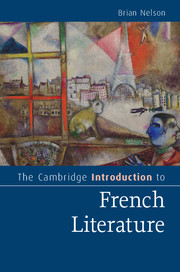Book contents
- Frontmatter
- Dedication
- Contents
- Preface
- Acknowledgements
- Chronology
- 1 Villon: a dying man
- 2 Rabelais: the uses of laughter
- 3 Montaigne: self-portrait
- 4 Corneille: heroes and kings
- 5 Racine: in the labyrinth
- 6 Molière: new forms of comedy
- 7 La Fontaine: the power of fables/fables of power
- 8 Madame de Lafayette: the birth of the modern novel
- 9 Voltaire: the case for tolerance
- 10 Rousseau: man of feeling
- 11 Diderot: the enlightened sceptic
- 12 Laclos: dangerous liaisons
- 13 Stendhal: the pursuit of happiness
- 14 Balzac: ‘All is true’
- 15 Hugo: the divine stenographer
- 16 Baudelaire: the streets of Paris
- 17 Flaubert: the narrator vanishes
- 18 Zola: the poetry of the real
- 19 Huysmans: against nature
- 20 Mallarmé: the magic of words
- 21 Rimbaud: somebody else
- 22 Proust: the self, time and art
- 23 Jarry: the art of provocation
- 24 Apollinaire: impresario of the new
- 25 Breton … Company: Surrealism
- 26 Céline: night journey
- 27 Sartre: writing in the world
- 28 Camus: a moral voice
- 29 Beckett: filling the silence
- 30 French literature into the twenty-first century
- Notes
- Further reading
- Index of authors and titles
- Index of genres, movements and concepts
- Cambridge Introductions to …
- References
14 - Balzac: ‘All is true’
Published online by Cambridge University Press: 05 July 2015
- Frontmatter
- Dedication
- Contents
- Preface
- Acknowledgements
- Chronology
- 1 Villon: a dying man
- 2 Rabelais: the uses of laughter
- 3 Montaigne: self-portrait
- 4 Corneille: heroes and kings
- 5 Racine: in the labyrinth
- 6 Molière: new forms of comedy
- 7 La Fontaine: the power of fables/fables of power
- 8 Madame de Lafayette: the birth of the modern novel
- 9 Voltaire: the case for tolerance
- 10 Rousseau: man of feeling
- 11 Diderot: the enlightened sceptic
- 12 Laclos: dangerous liaisons
- 13 Stendhal: the pursuit of happiness
- 14 Balzac: ‘All is true’
- 15 Hugo: the divine stenographer
- 16 Baudelaire: the streets of Paris
- 17 Flaubert: the narrator vanishes
- 18 Zola: the poetry of the real
- 19 Huysmans: against nature
- 20 Mallarmé: the magic of words
- 21 Rimbaud: somebody else
- 22 Proust: the self, time and art
- 23 Jarry: the art of provocation
- 24 Apollinaire: impresario of the new
- 25 Breton … Company: Surrealism
- 26 Céline: night journey
- 27 Sartre: writing in the world
- 28 Camus: a moral voice
- 29 Beckett: filling the silence
- 30 French literature into the twenty-first century
- Notes
- Further reading
- Index of authors and titles
- Index of genres, movements and concepts
- Cambridge Introductions to …
- References
Summary
I shall have carried an entire society in my head!
– Balzac, Letter of 1844The importance of Honoré de Balzac (1799–1850) in the history of French literature lies in his exemplary role in the establishment of the fictional model that came to be known as ‘realism’ – a sociological type of fiction that emphasized the material and historical circumstances of people's lives rather than individual psychology. The realist novel is concerned above all with man in society. It privileges the world of common experience, presenting man in a dynamic relationship with the forces and institutions that shape collective existence: money, power, class, convention. As an aesthetic category, realism is defined above all by its mimetic urge: that is, by its commitment to the idea that the primary role of the novel is the representation of the ‘real’ world.
The Human Comedy
Born at the very end of the eighteenth century, Balzac grew up during the turbulent years of Napoleon, came of age during the Restoration of the Bourbon monarchy after Waterloo and wrote most of his fiction during the reign of Louis-Philippe (the so-called citizen king, 1830–48). The central social development of Balzac's lifetime was the rise of the bourgeoisie to a commanding position in French economic and political life. The ethos of the age was encapsulated in the celebrated phrase of François Guizot, Louis-Philippe's prime minister (referring to his belief that suffrage should be restricted to propertied men, and that those who wanted the vote should become rich through thrift and hard work): ‘Make money’ (‘Enrichissez-vous’). Balzac himself was a man of reactionary views, a monarchist and a Roman Catholic who lamented the passing of what he saw as the ordered, organic world of the Ancien Régime. His reactionary stance, however, enabled him to see all the more clearly the inevitable demise of the old order.
- Type
- Chapter
- Information
- The Cambridge Introduction to French Literature , pp. 96 - 105Publisher: Cambridge University PressPrint publication year: 2015



